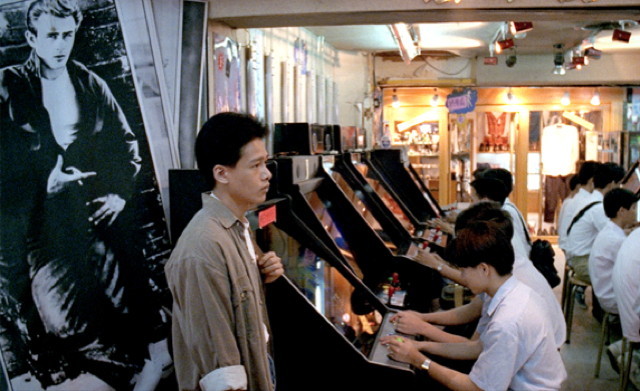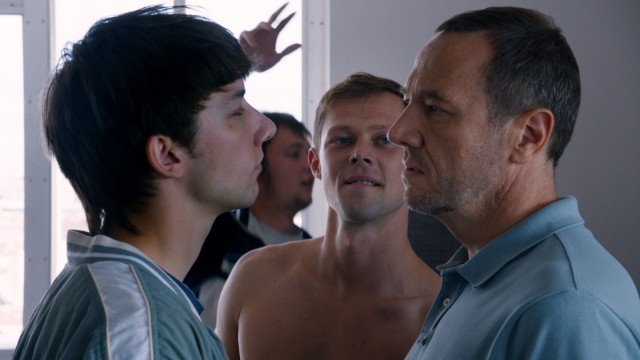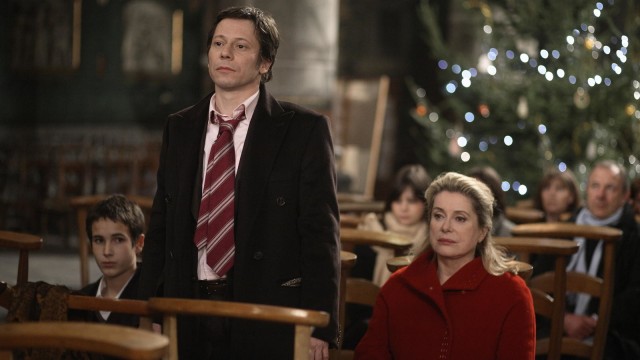
Mathieu Amalric and Catherine Deneuve star as siblings in a dysfunctional family in Arnaud Desplechin’s A CHRISTMAS TALE
A CHRISTMAS TALE (UN CONTE DE NOËL) (Arnaud Desplechin, 2008)
Film Society of Lincoln Center
Francesca Beale Theater, Elinor Bunin Munroe Film Center
144 West 65th St. between Eighth Ave. & Broadway
Saturday, March 12, 8:00, and Wednesday, March 16, 7:00
Series runs March 11-17
www.filmlinc.org
 One of the best films of 2008, A Christmas Tale is yet another extraordinary work from French post-New Wave filmmaker Arnaud Desplechin (La Sentinelle, Esther Kahn). Desplechin, who examined family dysfunction in the masterful Kings and Queen (one of the best films of 2006), brings back much of the same cast for A Christmas Tale. Catherine Deneuve stars as Junon, the family matriarch who has just discovered she has leukemia and is in need of a bone-marrow transplant. Although it is rare for children to donate bone marrow to their mother (or grandmother), Junon insists that they all take the test to see if they are compatible. Soon they gather at Junon and Abel’s (Jean-Paul Roussilon) house for the holidays: oldest daughter Elizabeth (Anne Consigny), a dark and depressed woman whose teenage son, Paul (Emile Berling), has been institutionalized with mental problems and whose husband, Claude (Hippolyte Girardot), is rarely home; Ivan (Melvil Poupaud), the youngest son, a carefree sort married to Sylvia (Chiara Mastroianni, Deneuve’s real-life daughter), whom Junon strongly distrusts; and black sheep Henri (Mathieu Amalric), the middle child who was initially conceived primarily to save Abel and Junon’s first son, Joseph, who ended up dying of the same leukemia that Junon has contracted. Henri, who shows up with a new girlfriend, the very direct Faunia (Emmanuelle Devos), is a philandering ne’er-do-well who is deeply estranged from Elizabeth and not close with his mother, leading to much strife as Christmas — and a possible transplant — nears. Desplechin, who wrote the script with playwright and director Emmanuel Bourdieu, once again has created powerful, realistic characters portrayed marvelously by his extremely talented cast; despite the family’s massive dysfunction, you’ll feel that even spending more than two and a half hours with them is not enough. A Christmas Tale is screening March 12 & 16 in the Film Society of Lincoln Center series “Golden Days: The Films of Arnaud Desplechin,” a weeklong retrospective celebrating the March 18 release of his latest film, My Golden Days. Running March 11-17, the festival features such other films as My Sex Life . . . or How I Got into an Argument, La vie des morts (which Desplechin will introduce on March 15), Kings and Queen (which will be followed by a Q&A with the director on March 17), and My Golden Days (with Desplechin on hand for Q&As after screenings on March 15 & 18).
One of the best films of 2008, A Christmas Tale is yet another extraordinary work from French post-New Wave filmmaker Arnaud Desplechin (La Sentinelle, Esther Kahn). Desplechin, who examined family dysfunction in the masterful Kings and Queen (one of the best films of 2006), brings back much of the same cast for A Christmas Tale. Catherine Deneuve stars as Junon, the family matriarch who has just discovered she has leukemia and is in need of a bone-marrow transplant. Although it is rare for children to donate bone marrow to their mother (or grandmother), Junon insists that they all take the test to see if they are compatible. Soon they gather at Junon and Abel’s (Jean-Paul Roussilon) house for the holidays: oldest daughter Elizabeth (Anne Consigny), a dark and depressed woman whose teenage son, Paul (Emile Berling), has been institutionalized with mental problems and whose husband, Claude (Hippolyte Girardot), is rarely home; Ivan (Melvil Poupaud), the youngest son, a carefree sort married to Sylvia (Chiara Mastroianni, Deneuve’s real-life daughter), whom Junon strongly distrusts; and black sheep Henri (Mathieu Amalric), the middle child who was initially conceived primarily to save Abel and Junon’s first son, Joseph, who ended up dying of the same leukemia that Junon has contracted. Henri, who shows up with a new girlfriend, the very direct Faunia (Emmanuelle Devos), is a philandering ne’er-do-well who is deeply estranged from Elizabeth and not close with his mother, leading to much strife as Christmas — and a possible transplant — nears. Desplechin, who wrote the script with playwright and director Emmanuel Bourdieu, once again has created powerful, realistic characters portrayed marvelously by his extremely talented cast; despite the family’s massive dysfunction, you’ll feel that even spending more than two and a half hours with them is not enough. A Christmas Tale is screening March 12 & 16 in the Film Society of Lincoln Center series “Golden Days: The Films of Arnaud Desplechin,” a weeklong retrospective celebrating the March 18 release of his latest film, My Golden Days. Running March 11-17, the festival features such other films as My Sex Life . . . or How I Got into an Argument, La vie des morts (which Desplechin will introduce on March 15), Kings and Queen (which will be followed by a Q&A with the director on March 17), and My Golden Days (with Desplechin on hand for Q&As after screenings on March 15 & 18).
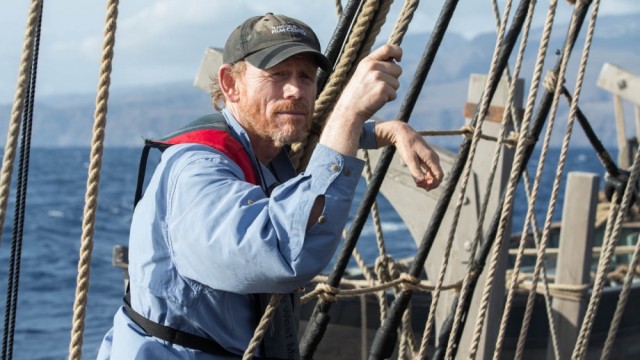
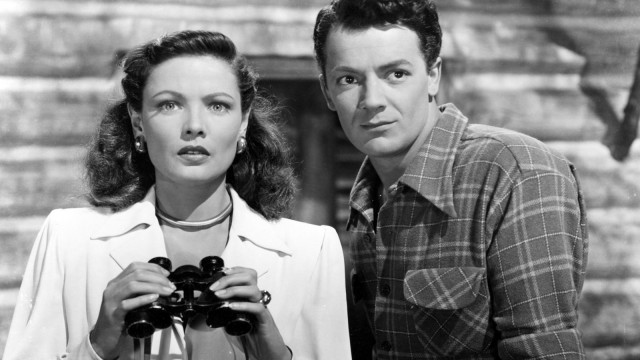

 Shortly after meeting Ron “Stray Dog” Hall at the Biker Church in Branson, Missouri, writer-director Debra Granik (Down to the Bone) cast the Vietnam vet as Thump Milton in her second feature, the Oscar-nominated Winter’s Bone. Upon learning more about him, she soon decided that he would be a great subject for a documentary, so she took to the road, following him across the country in the engaging and revealing Stray Dog. Nearly always dressed in black, including his treasured leather jacket covered in medals and patches — when he puts it in a suitcase for a trip, it’s a ritual like he’s folding the American flag — Hall is a wonderfully grizzled old man with a fluffy white beard. At home, he is learning Spanish online so he can communicate better with his new wife, Alicia, a Mexican immigrant, and her two sons (who still live across the border). He visits with his teenage granddaughter, who is making some questionable decisions about her future. In Missouri, he owns and operates the At Ease RV Park, where he gives breaks to fellow vets who can’t always afford to pay the rent. And when he goes on the road, participating in the Run for the Wall, joining up with thousands of other bikers heading for the annual service at the Vietnam Veterans Memorial in Washington, DC, he stops along the way at other ceremonies honoring soldiers who have gone missing, are POWs, or were killed in action in Vietnam, Iraq, Afghanistan, and other wars.
Shortly after meeting Ron “Stray Dog” Hall at the Biker Church in Branson, Missouri, writer-director Debra Granik (Down to the Bone) cast the Vietnam vet as Thump Milton in her second feature, the Oscar-nominated Winter’s Bone. Upon learning more about him, she soon decided that he would be a great subject for a documentary, so she took to the road, following him across the country in the engaging and revealing Stray Dog. Nearly always dressed in black, including his treasured leather jacket covered in medals and patches — when he puts it in a suitcase for a trip, it’s a ritual like he’s folding the American flag — Hall is a wonderfully grizzled old man with a fluffy white beard. At home, he is learning Spanish online so he can communicate better with his new wife, Alicia, a Mexican immigrant, and her two sons (who still live across the border). He visits with his teenage granddaughter, who is making some questionable decisions about her future. In Missouri, he owns and operates the At Ease RV Park, where he gives breaks to fellow vets who can’t always afford to pay the rent. And when he goes on the road, participating in the Run for the Wall, joining up with thousands of other bikers heading for the annual service at the Vietnam Veterans Memorial in Washington, DC, he stops along the way at other ceremonies honoring soldiers who have gone missing, are POWs, or were killed in action in Vietnam, Iraq, Afghanistan, and other wars.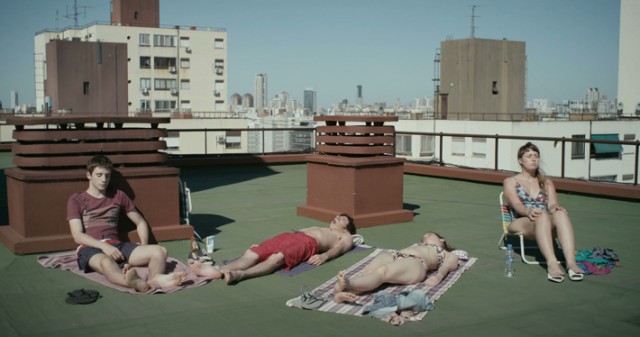
 Last year, award-winning Argentine writer-director Martín Rejtman returned with his first film in eight years (and only his fourth feature in his nearly thirty-year career), the absurdist black comedy Two Shots Fired. The calmly paced story begins as sixteen-year-old Mariano (Rafael Federman), after a night of dancing, goes about his daily chores, swimming laps in his family’s backyard pool (as the dog runs alongside him) and mowing the lawn. He shows no emotion when he accidentally runs over the mower’s electric cord; instead he simply goes into the house for tools to fix it. There he also finds a box with a gun, so he goes into his room, puts the gun against his head, and pulls the trigger, like it’s a perfectly normal thing to do. He then places the barrel against his stomach and shoots himself a second time. The first shot merely grazes his temple, while the second shot seems to have left a bullet lodged in his body. Mariano evenhandedly claims that he is not depressed and was not trying to kill himself, and his friends and family essentially act as if nothing has happened, going on with their simple, ordinary lives. The only ones who appear to be even the slightest bit concerned are his mother (Susana Pampin), who secretly hides all the scissors and kitchen knives, and the dog, who runs away.
Last year, award-winning Argentine writer-director Martín Rejtman returned with his first film in eight years (and only his fourth feature in his nearly thirty-year career), the absurdist black comedy Two Shots Fired. The calmly paced story begins as sixteen-year-old Mariano (Rafael Federman), after a night of dancing, goes about his daily chores, swimming laps in his family’s backyard pool (as the dog runs alongside him) and mowing the lawn. He shows no emotion when he accidentally runs over the mower’s electric cord; instead he simply goes into the house for tools to fix it. There he also finds a box with a gun, so he goes into his room, puts the gun against his head, and pulls the trigger, like it’s a perfectly normal thing to do. He then places the barrel against his stomach and shoots himself a second time. The first shot merely grazes his temple, while the second shot seems to have left a bullet lodged in his body. Mariano evenhandedly claims that he is not depressed and was not trying to kill himself, and his friends and family essentially act as if nothing has happened, going on with their simple, ordinary lives. The only ones who appear to be even the slightest bit concerned are his mother (Susana Pampin), who secretly hides all the scissors and kitchen knives, and the dog, who runs away. 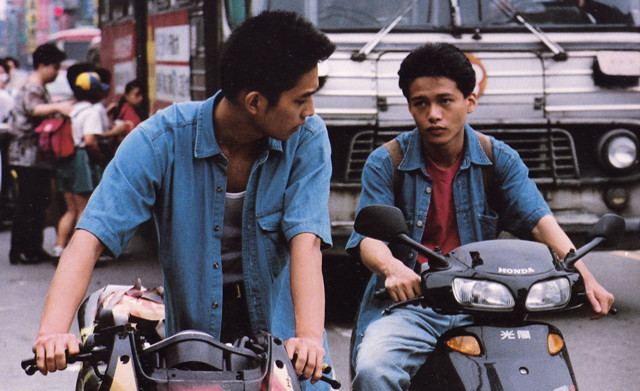
 If you’re going to make a movie with the awesome title Rebels of the Neon God, it better be a damn fine, supercool, unusual, even rebellious film. And that’s exactly what Malaysian-born Taiwanese filmmaker Tsai Ming-liang’s debut feature is, a damn fine, supercool, unusual, and rebellious film about teen angst and urban alienation in a changing Taipei. Written and directed by Tsai, who went on to make such other stunners as The River, The Hole, Vive l’Amour, and What Time Is It There?, among others, Rebels of the Neon God is a slowly paced minimalist tale of interrelated characters who come together in fascinating, unexpected ways. Lee Kang-sheng, whom Tsai discovered smoking a cigarette on the street (for the television piece Kids), stars as Hsiao-kang, a teenager who has decided to cash out of cram school without telling his parents. His father (Tien Miao), a cabdriver, and his mother (Lu Yi-ching), a spiritualist who believes that her son is the reincarnation of the rebel protection deity Nezha, don’t know what to do with their extremely quiet son, who seems to have little interest in life except for going to video arcades. Meanwhile, Ah Tze (Chen Chao-jung) is living an odd life himself, stealing change from public phone booths and becoming friendly with a young woman, Ah Kuei (Wang Yu-wen), who slept with his brother, Ah Bing (Jen Chang-bin). One afternoon, Ah Tze and Ah Kuei are on a scooter when they pull alongside Hsiao-kang and his father in a cab, and after getting honked at for blocking a lane, Ah Bing smashes the father’s side-view mirror, a deed that Hsiao-kang decides is not going to go unpunished.
If you’re going to make a movie with the awesome title Rebels of the Neon God, it better be a damn fine, supercool, unusual, even rebellious film. And that’s exactly what Malaysian-born Taiwanese filmmaker Tsai Ming-liang’s debut feature is, a damn fine, supercool, unusual, and rebellious film about teen angst and urban alienation in a changing Taipei. Written and directed by Tsai, who went on to make such other stunners as The River, The Hole, Vive l’Amour, and What Time Is It There?, among others, Rebels of the Neon God is a slowly paced minimalist tale of interrelated characters who come together in fascinating, unexpected ways. Lee Kang-sheng, whom Tsai discovered smoking a cigarette on the street (for the television piece Kids), stars as Hsiao-kang, a teenager who has decided to cash out of cram school without telling his parents. His father (Tien Miao), a cabdriver, and his mother (Lu Yi-ching), a spiritualist who believes that her son is the reincarnation of the rebel protection deity Nezha, don’t know what to do with their extremely quiet son, who seems to have little interest in life except for going to video arcades. Meanwhile, Ah Tze (Chen Chao-jung) is living an odd life himself, stealing change from public phone booths and becoming friendly with a young woman, Ah Kuei (Wang Yu-wen), who slept with his brother, Ah Bing (Jen Chang-bin). One afternoon, Ah Tze and Ah Kuei are on a scooter when they pull alongside Hsiao-kang and his father in a cab, and after getting honked at for blocking a lane, Ah Bing smashes the father’s side-view mirror, a deed that Hsiao-kang decides is not going to go unpunished.